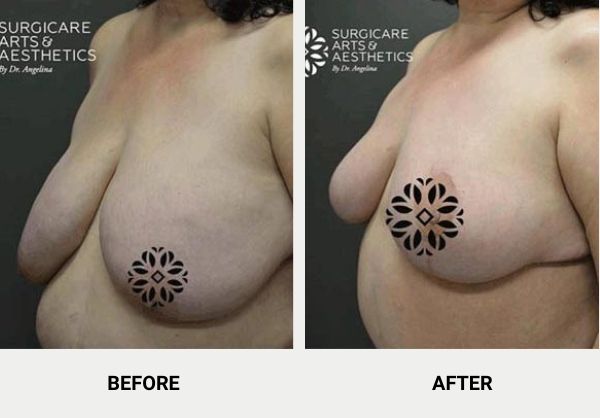Women who have breasts that are disproportionately large compared to the rest of their bodies often suffer from painful symptoms that affect their daily lives. Breast reduction surgery can alleviate physical pain but also any associated emotional issues they may be experiencing resulting from the size of their breasts.
Eliminating excess fat and breast tissue to create smaller, more proportionate contours will reduce both the weight and size of the breasts. The surgeon often corrects excess loose and stretched skin during the procedure leaving the patient with firmer, rounder, perkier, and more proportional breasts.
How Does It Take to Recover From Breast Reduction Surgery?
When contemplating any surgery, it is always important to understand the recovery process and acknowledge that the speed at which you heal and recover will depend greatly on how well you follow all the provided aftercare instructions.
Each patient’s recovery from breast reduction surgery will vary depending on their unique genetic makeup, overall health, lifestyle factors, surgical technique used, and the extent of the surgery performed (how much breast tissue was removed, etc).
The recovery time for breast reduction surgery is a bit easier than other breast augmentation surgeries because it does not involve any alterations to the underlying muscle. It normally takes anywhere from three to six weeks to recover from breast reduction surgery.

Breast Reduction Recovery Timeline – Week by Week Guide
Day 1 – The First 24 Hours Post-Op
Breast reduction surgery is done under general anesthesia as an outpatient procedure but you will spend a few hours in a recovery room before being discharged to go home.
You will slowly wake up from surgery and the medical staff will monitor you for a few hours to ensure that you are not experiencing anything unusual. You may feel nauseous as this is a common side effect of general anesthesia but it should dissipate in a few hours.
You will most likely have bandages and surgical tape covering your incisions and a special bra that will help gently support the incision sites as well as mitigate swelling and bruising.
Depending on the extent of your breast reduction, you may also have surgical drains that will help to eliminate excess fluid and minimize swelling but they will usually only be needed for a few days.
As soon as you are able, one of the medical assistants will get you up to walk slowly around the room to encourage blood circulation and lower the risk of blot clots. You will need to continue these short walks a few times a day during your recovery.
When the surgeon feels you are ready to be discharged, they will release you into the care of your friend or family member who will take you home. (you will not be able to drive) The surgeon will send you home with instructions that detail how to take care of your incisions, your drains, and yourself over the next several weeks to ensure you heal properly.
Depending on the extent of your surgery, your surgeon may provide you with prescriptions for pain medication and/or an antibiotic to help prevent infection. Some patients who undergo a breast reduction do not require prescription-strength pain medication and they are pleasantly surprised that they are not in the degree of pain they were expecting.
Days 2-4 After Breast Reduction Surgery
Make sure to review all the instructions given to you by the surgeon to ensure you are following them precisely. Taking proper care of your incisions, getting enough rest, and avoiding activities that your surgeon has listed as “restricted” will expedite your full recovery. The best way to achieve exceptional results from your surgery is by following the surgeon’s orders.
Continue taking your “circulation walks” every few hours or so these first few days to prevent complications.
Normally after 48 hours, most surgeons will allow patients to take a shower.
Most patients experience a peak in the normal post-surgical swelling during this time which may cause some discomfort. Also, it is normal to feel exceptionally fatigued after undergoing a surgical procedure under general anesthesia.
You will also have some difficulty with movement these first few days and should enlist the help of a friend or family member to help you dress, change bandages, or perform other necessary tasks.
Most patients take a week or two off from work but many are ready to go back to non-strenuous work or their desk job in just 3 or 4 days.
Week 1 After Surgery
During the first few weeks of your breast reduction recovery, you should concentrate on resting, eating a healthy diet, staying properly hydrated, and avoiding strenuous activity or heavy lifting to promote proper healing.
You may still be experiencing fatigue so allow yourself to rest when you feel yourself getting tired. Do not try to do too much too soon.
You will still be experiencing swelling which may last several weeks and you may have started to see visible bruising. Both are normal and will gradually resolve on their own.
Weeks 1-2 After Breast Reduction
Many patients begin to feel much more like themselves after about 10 days, however, it is important to remember that your body is in the process of healing and you need to continue to take it easy. Continuing to get an adequate amount of rest helps your body have the energy to properly heal.
You will most likely have a follow-up visit with your surgeon during this time to check on your recovery process. Most surgeons use sutures that dissolve so there will be no need to remove any stitches.
Any pain you have been feeling should be greatly reduced or completely gone and the “tightness” you have felt in your breasts should also be easing.
Some of the swelling should be subsiding by this time but patients can experience swelling for months. If you notice the swelling becoming worse or you have areas of redness or areas that are red and warm, you may have an infection and your doctor should be contacted immediately.
Typically the surgeon will clear you for driving after about 10 days to 2 weeks.
1 Month of Breast Reduction Recovery
You should take care to be gentle with your breasts for at least 4-6 weeks to allow enough time for them to heal internally as well as externally. You may experience itching along the incision site as you heal which is normal.
Wear soft clothing and avoid clothing that is too tight so you are comfortable. Avoid strenuous motions and do not wear bras or clothing with underwire until the surgeon clears you.
Normally by the end of this month, you will be able to begin some light activity and exercise as long as it does not put pressure or stress on your chest.
Some patients experience numbness or have reduced sensation in their nipples or some breast tissue which is normally temporary.
1-2 Months Breast Reduction Post-Op
You should feel comfortable consistently and should also feel like your energy has returned. If you had stitches that self-dissolve, they should have disappeared by this time. Your strength and the range of motion in your chest area should be restored.
Your surgeon will more than likely give you permission to resume your exercise routine, soak in the bathtub and sleep on your side or stomach if you desire. After about 6 weeks you can also wear that cute new underwire bra and begin admiring your new breasts.
Your incisions will be outwardly healing and will result in some scarring however most of the scarring will be well hidden. Some topical creams and gels can be used to keep scarring to a minimum and your surgeon will advise you when to begin using them.
Breast Reduction Surgery Can Improve Your Quality Of Life
Overall the recovery after having a breast reduction is minimal compared to other types of body contouring surgery. The satisfaction ratings gained after a breast reduction are almost the highest among all types of cosmetic surgeries. Patients often remark their only regret is living with the pain and enduring the discomfort of their disproportionate breasts for so long and not having breast reduction surgery earlier.
Popular Questions About Recovery From Breast Reduction Surgery
Some of the most frequently asked questions regarding a breast reduction procedure are “How painful is breast reduction recovery?”, “How long does it take for breasts to look normal after reduction surgery?”, and “Will I have scars from breast reduction surgery?” Watch the following video to hear Dr. Angelina Postoev addresses these and a few other questions about breast reduction recovery.
If you are living with pain and physical and/or emotional discomfort due to overly large breasts, a breast reduction may be right for you. After a breast reduction, you may be able to participate in activities you have been wanting to try, your clothing choices and the way they fit will be enhanced, and your chronic pain will be eliminated.
Contact IBI Plastic Surgery & Med Spa to set up a consultation and learn more about breast reduction surgery. Dr. Angelina Postoev, a triple-board certified cosmetic surgeon, an expert in breast reduction surgery, and Christopher Ibikunle, MD, FACS, offer Breast Reductions in Lawrenceville, Suwanee, Johns Creek, Duluth, Buckhead, and the surrounding areas of Georgia.







